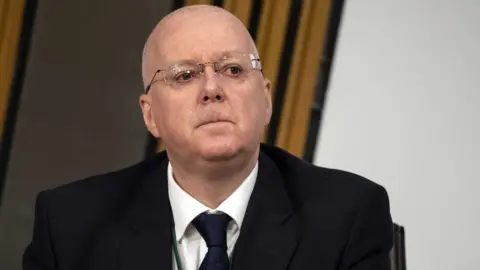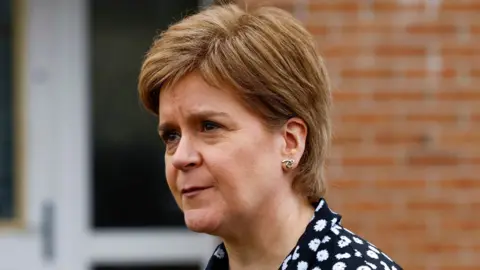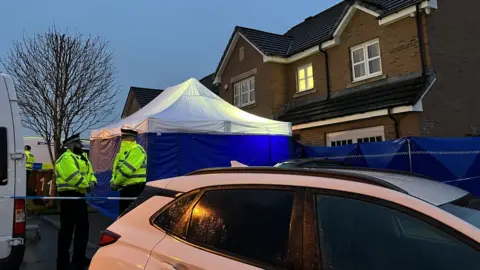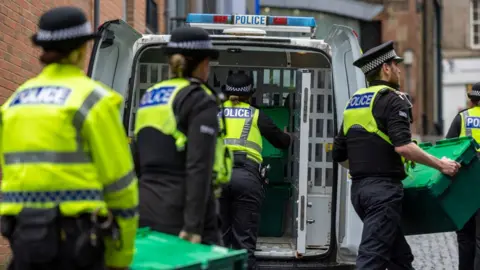Nicola Sturgeon's husband Peter Murrell released without charge after arrest
 PA Media
PA MediaFormer SNP chief executive Peter Murrell has been released without charge by the police, pending further investigation into party finances.
Mr Murrell, 58, the husband of former first minister Nicola Sturgeon, was arrested on Wednesday morning.
He was questioned while police searched their Glasgow home and SNP headquarters as part of their investigation.
Ms Sturgeon said she had "no prior knowledge" of Police Scotland's plans. The force said inquiries were ongoing.
In a statement, Police Scotland said Mr Murrell was arrested at 07:45 and released shortly before 19:00.
"Officers also carried out searches today at a number of addresses as part of the investigation," the statement added.
"A report will be sent to the Crown Office and Procurator Fiscal Service."
Mr Murrell resigned as SNP chief executive last month, after holding the post since 1999.
He has been married to Ms Sturgeon since 2010.
 Getty Images
Getty ImagesA spokesperson for the former first minister said she was not warned about Police Scotland's "action or intentions" before the arrest.
They added: "Ms Sturgeon will fully cooperate with Police Scotland if required, however at this time no such request has been made."
Ms Sturgeon was succeeded last week as Scotland's first minister by Humza Yousaf.
Following Mr Murrell's arrest Mr Yousaf said that it was "a difficult day" for the SNP. He said his party had "fully cooperated" with police and would continue to do so.

Police activity continued at the Glasgow home of Mr Murrell and Ms Sturgeon on Wednesday evening.
Ms Sturgeon had been inside the house when officers arrived to make the arrest.
The house was sealed off with blue and white tape. A tent was erected on the driveway with a van parked inside.
Officers could also be seen searching a small shed and storage box in the back garden.
In Edinburgh at least six marked police vehicles were parked outside SNP HQ and officers carrying green crates and other equipment were seen going inside.
In July 2021 Police Scotland launched a formal investigation into the SNP's finances after receiving complaints about how donations were used.
Questions had been raised about funds given to the party for use in a fresh independence referendum campaign.
Seven people made complaints and a probe was set up following talks with prosecutors.
Ms Sturgeon had insisted at the time that she was "not concerned" about the party's finances.
She said "every penny" of cash raised in online crowdfunding campaigns would be spent on the independence drive.
According to a statement, the SNP raised a total of £666,953 through referendum-related appeals between 2017 and 2020. The party pledged to spend these funds on the independence campaign.
Questions were raised after its accounts showed it had just under £97,000 in the bank at the end of 2019, and total net assets of about £272,000.
 Getty Images
Getty ImagesLast year it emerged Mr Murrell gave a loan of more than £100,000 to the SNP to help it out with a "cash flow" issue after the last election.
The then SNP's chief executive loaned the party £107,620 in June 2021. The SNP had repaid about half of the money by October of that year.
At the time an SNP spokesman said the loan was a "personal contribution made by the chief executive to assist with cash flow after the Holyrood election".
He said it had been reported in the party's 2021 accounts, which were published by the Electoral Commission in August last year.
Weeks earlier, MP Douglas Chapman had resigned as party treasurer saying he had not been given the "financial information" to do the job.
Mr Murrell resigned last month after taking responsibility for misleading statements about a fall in party membership.
The number of members had fallen from the 104,000 it had two years ago to just over 72,000.


The release of Peter Murrell without charge isn't the end of this matter. Detectives will send the results of their long investigation to prosecutors who'll decide what happens next.
The Crown Office and Procurator Fiscal Service will have to be satisfied that there's sufficient admissible evidence to justify a prosecution.
They'll consider whether there's enough to show a crime was committed and the suspect was responsible. They'll also take the public interest into account.
That can be influenced by the particular circumstances of the case - for example, whether the person involved was in a position of trust or authority.
If they feel that there's insufficient evidence, they can instruct the police to carry out further inquiries. And after that, if the Fiscal still isn't satisfied that there's enough to take it to court, the case would go no further.
Needless to say, all of this will take time.
